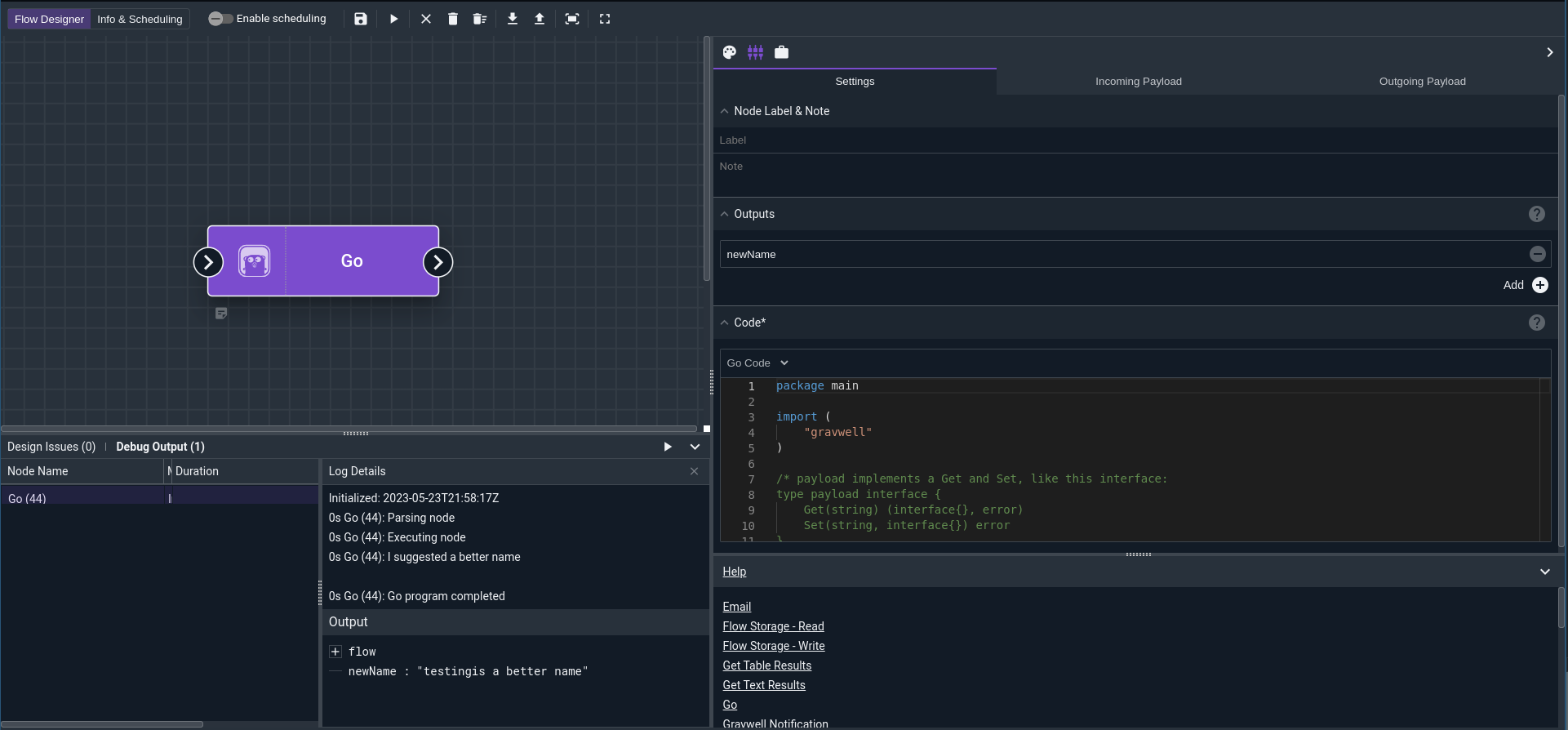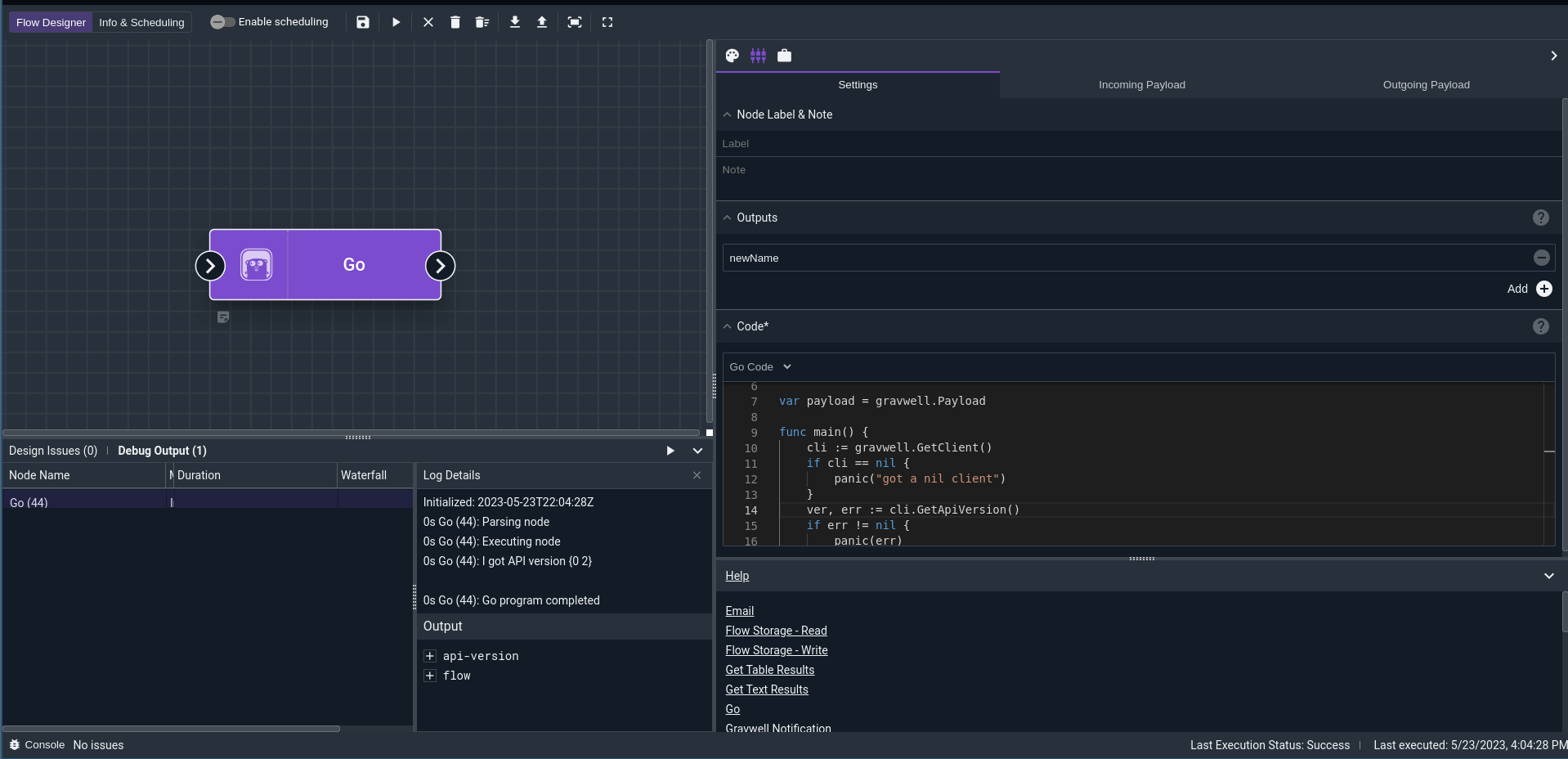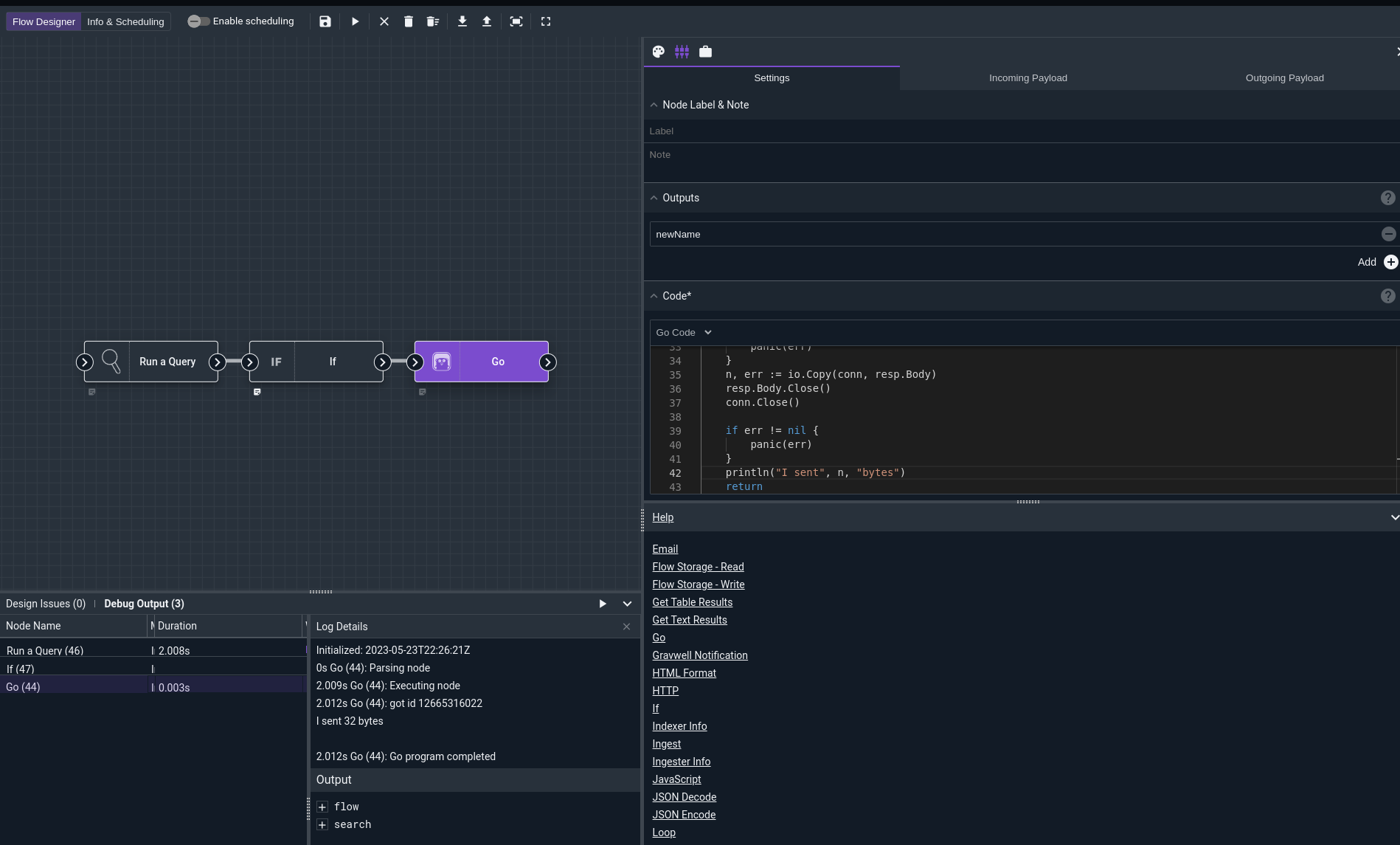Go Node#
This node can execute a limited subset of Go code in a flow. The node uses the open source Scriggo project to execute Go code using a custom interpreter.
Note
The Scriggo Go interpreter does not implement all of the Go specification and may behave unexpectedly when doing reflection or complex pointer operations. The Go node is useful for performing simple type-aware operations in a flow, not writing complex programs.
Restrictions#
The Go flow node has some notable restrictions on what it can and can’t do:
No goroutines. The
gokeyword is disabled and the node cannot launch goroutines.No reflection on custom types. The
reflectpackage cannot handle types defined in your programs.Limited libraries. You can only import libraries that are included in the searchagent. Full list at the end of this page.
No
unsafepackage and limited pointer operations. Theunsafepackage cannot be imported and pointer arithmetic will likely result in unexpected results.No
deferoperation. Sorry, not implemented, do it like it’s C99!
Configuration#
Code, required: The Go code to run.Outputs: a list of variables to be output from the program (see below).
Output#
The Go node can modify any value in the incoming payload. It can also create new items in the outgoing payload, but those new items must be listed in the Outputs config field.
Variables in the payload are accessed in Go code by using the Getter/Setter interface on the Payload variable exported in the gravwell package, e.g. gravwell.Payload.Set("foobar", 3.14159).
Debug Output#
All stdout or stderr output will be written to the Flow console log. This means including a println("hello mom!") will include hello mom! in the flow debug output.
Native Gravwell Package#
The Go flow node can import a package called gravwell that will allow access to flow specific functions and values. The gravwell package can almost be thought of as a “virtual” package because it simply maps global variables and some internal flow functionality to a package so that Go node programs can interact with flow variables.
The gravwell package exposes the following variables and functions:
Payload Getter and Setter#
One of the most useful variables in the gravwell package is the Payload variable which enables getting and setting natively typed values in the Flow payload. The Payload variable implements the following interface:
type Payload interface {
Get(string) (interface{}, error)
Set(string, interface{}) error
}
The Payload interface can get and set native types into the flow payload similar to the Javascript node or other logic nodes.
Note
Defining a new struct type in your Go program and setting it into the flow Payload may result in undefined behavior, because that type information won’t make it outside the Go flow node.
Blocking Flow Execution#
If you call gravwell.Block(), further execution will be blocked–nodes downstream of the Go node will not be executed.
if payload.Get(`flow.Name`) == "foo" {
gravwell.Block()
}
Other Package Types#
Name |
Type/Prototype |
Description |
|---|---|---|
|
The scheduled start time for the flow. This time may be far in the past if the flow is backfilling missed runs. |
|
|
The timestamp of the last run of this flow. |
|
|
The scheduled time duration of a flow run. This repesents the time window the flow should cover for any queries. |
|
|
|
The current flow ID. |
|
|
Returns an active logged in client for use, client.Client docs available. |
|
|
Set a natively typed value into a persistent map that can be retrieved across runs. |
|
|
Get a persistent map value from previous runs. |
|
|
Delete a value from the persistent map. |
|
|
Get a complete persistent map. |
|
|
Create a new backup with a provided |
|
|
Create a new backup with the provided |
|
|
Retrieve a system macro. |
|
|
Get a map of SysInfo structures using the system name as the map key. |
|
|
Get a map of IngesterStats keyed by terminating indexer UUID. |
|
|
Get a map of IdxStats keyed by indexer UUID. This API call is expensive and returns the complete shard state systemwide. |
|
|
Get a map of indexer health states keyed by indexer UUID. |
|
|
Create a Gravwell notification. |
|
|
Get a Gravwell resource. |
|
|
Set a Gravwell resource. |
|
|
Get the list of ScheduledSearch structures for the current user. |
|
|
Retrieve a secret value. This is the complete secret value, so be careful with this call. |
Examples#
Below are a few basic examples of using the Go node to perform some specific operations that may be useful in a Flow.
Payload Modification#
This program shows how we grab a value from the flow payload, modify it, and put it back. The basic flow might look like the following:

package main
import (
"gravwell"
)
var payload = gravwell.Payload
func main() {
if name, err := payload.Get(`flow.Name`); err != nil {
panic("Failed to get flow.Name")
} else if err = payload.Set(`newName`, name.(string) + "is a better name"); err != nil {
panic("failed to set new name")
}
println("I suggested a better name")
return
}
Getting a Client#
This program shows how to get a handle on a client and then use it to perform some more complicated operations.

package main
import (
"gravwell"
)
var payload = gravwell.Payload
func main() {
cli := gravwell.GetClient()
if cli == nil {
panic("got a nil client")
}
ver, err := cli.GetApiVersion()
if err != nil {
panic(err)
}
payload.Set("api-version", ver)
println("I got API version", ver)
return
}
Getting Search Results#
In this flow we grab a search ID and then use a client to download the results and relay them out to a TCP socket. This example demonstrates using the Go node to attach to a native search type as well as export the data through an imported library function.

package main
import (
"gravwell"
"net"
"fmt"
"io"
"github.com/gravwell/gravwell/v3/client/types"
)
var payload = gravwell.Payload
func main() {
cli := gravwell.GetClient()
if cli == nil {
panic("got a nil client")
}
val, err := payload.Get(`search.ID`)
if err != nil {
panic(err)
}
id := fmt.Sprintf("%v", val)
println("got id", id)
conn, err := net.Dial("tcp", "172.17.0.2:8888")
if err != nil {
panic(err)
}
tr := types.TimeRange{} //blank for all time
resp, err := cli.SearchDownloadRequest(id, `csv`, tr)
if err != nil {
panic(err)
}
n, err := io.Copy(conn, resp.Body)
resp.Body.Close()
conn.Close()
if err != nil {
panic(err)
}
println("I sent", n, "bytes")
return
}
Available Libraries For Import#
Standard Library Packages#
archive/tar
archive/zip
bufio
bytes
compress/bzip2
compress/flate
compress/gzip
compress/lzw
compress/zlib
container/heap
container/list
container/ring
context
crypto
crypto/aes
crypto/cipher
crypto/des
crypto/dsa
crypto/ecdsa
crypto/elliptic
crypto/hmac
crypto/md5
crypto/rand
crypto/rc4
crypto/rsa
crypto/sha1
crypto/sha256
crypto/sha512
crypto/subtle
crypto/tls
crypto/x509
crypto/x509/pkix
debug/dwarf
debug/elf
debug/gosym
debug/macho
debug/pe
debug/plan9obj
encoding
encoding/ascii85
encoding/asn1
encoding/base32
encoding/base64
encoding/binary
encoding/csv
encoding/gob
encoding/hex
encoding/json
encoding/pem
encoding/xml
errors
expvar
flag
fmt
go/ast
go/build
go/constant
go/doc
go/format
go/importer
go/parser
go/printer
go/scanner
go/token
go/types
hash
hash/adler32
hash/crc32
hash/crc64
hash/fnv
hash/maphash
html
html/template
image
image/color
image/color/palette
image/draw
image/gif
image/jpeg
image/png
index/suffixarray
io
io/ioutil Excluding
ReadDirReadFileTempDirTempFileWriteFileio/fs
math
math/big
math/bits
math/cmplx
math/rand
mime
mime/multipart
mime/quotedprintable
net/http/cgi
net/http/cookiejar
net/http/pprof
net/textproto
net/url
path
path/filepath
reflect
regexp
regexp/syntax
sort
strconv
strings
sync
sync/atomic
text/scanner
text/tabwriter
text/template
text/template/parse
time
unicode
unicode/utf16
unicode/utf8
Gravwell Library Packages#
github.com/gravwell/gravwell/v3/ingest
github.com/gravwell/gravwell/v3/ingest/entry
github.com/gravwell/gravwell/v3/ingest/config
github.com/gravwell/gravwell/v3/ingest/log
github.com/gravwell/gravwell/v3/client
github.com/gravwell/gravwell/v3/client/objlog
github.com/gravwell/gravwell/v3/client/types
github.com/gravwell/gravwell/v3/client/websocketRouter
github.com/gravwell/gravwell/v3/ipexist
github.com/gravwell/gravwell/v3/timegrinder
Third Party Packages#
github.com/BurntSushi/toml
github.com/Knetic/govaluate
github.com/Pallinder/go-randomdata AS randomdata
github.com/TylerBrock/colorjson
github.com/abadojack/whatlanggo
github.com/abiosoft/readline
github.com/auyer/steganography
github.com/blevesearch/segment
github.com/bndr/gotabulate
github.com/buger/jsonparser
github.com/crewjam/rfc5424
github.com/dchest/siphash
github.com/dennwc/ioctl
github.com/go-openapi/strfmt
github.com/go-yaml/yaml
github.com/gobwas/glob
github.com/golang-jwt/jwt
github.com/golang/snappy
github.com/gomarkdown/markdown
github.com/google/uuid
github.com/gravwell/gcfg
github.com/gravwell/grokky
github.com/gravwell/ipfix
github.com/gravwell/srslog
github.com/h2non/filetype
github.com/howeyc/gopass
github.com/jaytaylor/html2text
github.com/klauspost/compress
github.com/klauspost/oui
github.com/lunixbochs/vtclean
github.com/lib/pq
github.com/manifoldco/promptui
github.com/mattn/go-colorable
github.com/minio/highwayhash
github.com/mmcloughlin/spherand
github.com/olekukonko/tablewriter
github.com/oschwald/maxminddb-golang AS maxminddb
github.com/pkg/errors
github.com/sijms/go-ora AS go_ora
github.com/smartystreets/assertions
github.com/ssor/bom
github.com/tidwall/gjson
github.com/twmb/murmur3
github.com/vjeantet/grok